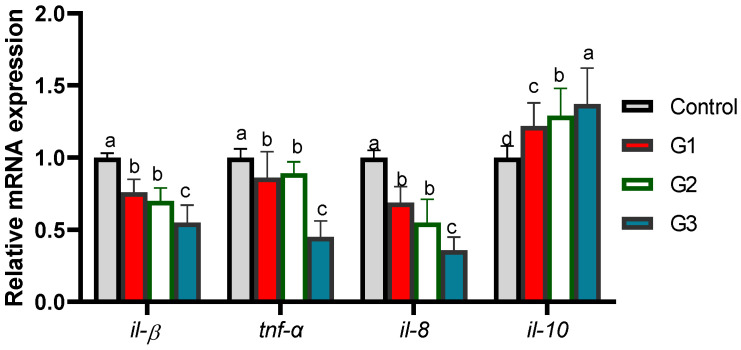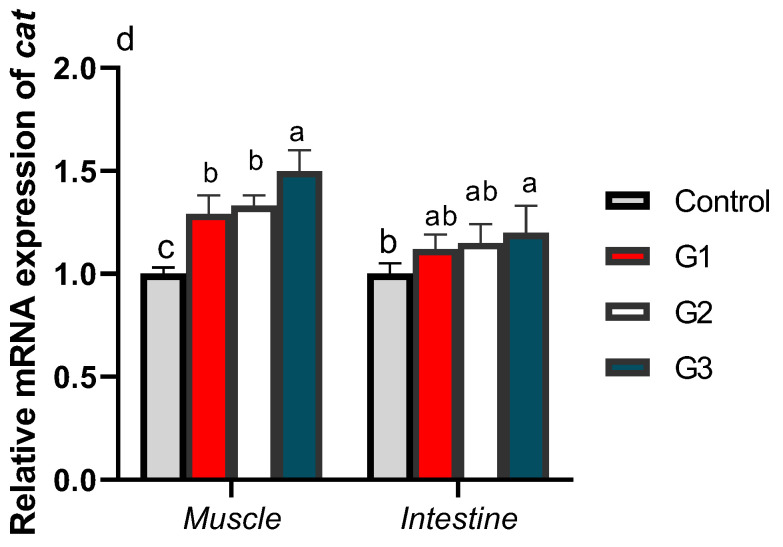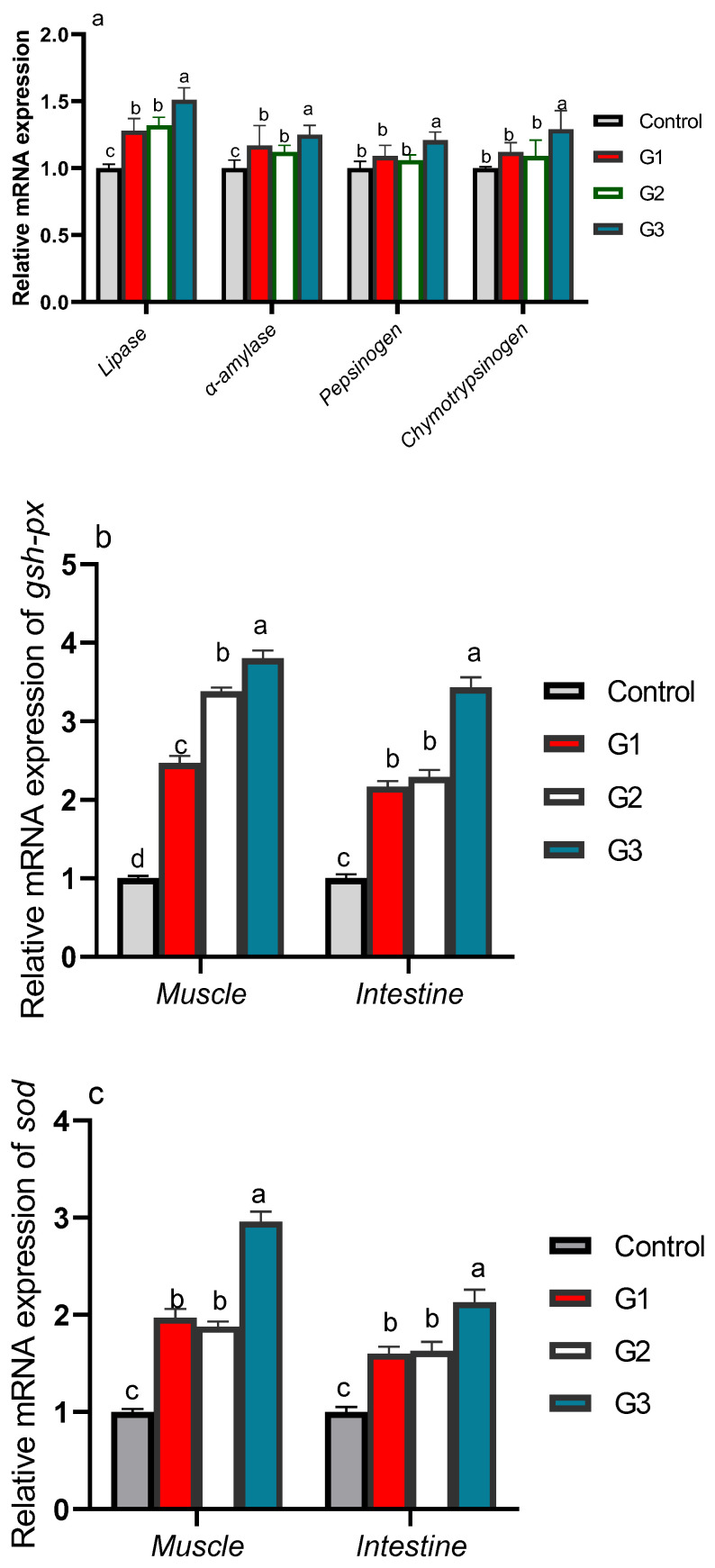Exploring the Interactive Effects of Thymol and Thymoquinone: Moving towards an Enhanced Performance, Gross Margin, Immunity and Aeromonas sobria Resistance of Nile Tilapia (Oreochromis niloticus).
引用次数: 12
Abstract
Simple Summary In modern aquaculture, fish have been subjected to intensive stressful conditions, which threaten their growth rate and increase their susceptibility to bacterial diseases. Innovative and sustainable production strategies in aquaculture have encouraged the utilization of plant-derived bioactive molecules (phytogenics) in fish diets, especially when they were used in a unique blend offering enumerable growth and health benefits. Therefore, our research was conducted to uncover the potential nutritional and immunological impacts of thymol (Thy) and/or thymoquinone (ThQ) with a disease shielding effect against Aeromonas sobria. Herein, the integration of dietary Thy and ThQ provided an efficient way to improve fish growth-related parameters and muscle antioxidant capacity. Moreover, we presented evidence for the unique immune-stimulating role of a Thy and ThQ combination with a successful forefront defense against A. sobria experimental infection in Nile tilapia. Our key findings motived the application of a dietary blend comprising Thy and ThQ as a functional feed that fights the challenges facing the aquaculture industry with maximized fish productivity. Abstract Plant-derived bioactive compounds with promising nutritional and therapeutic attributes (phytogenics) are among the top priorities in the aquaculture sector. Therefore, the impact of thymol (Thy) and/or thymoquinone (ThQ) on the growth, immune response antioxidant capacity, and Aeromonas sobria (A. sobria) resistance of Nile tilapia was investigated. Four fish groups were fed a control diet and three basal diets supplemented with 200 mg/kg diet of Thy or ThQ and a blend of both Thy and ThQ at a level of 200 mg/kg diet each. At the end of the feeding trial (12 weeks), the tilapias were challenged intraperitoneally with virulent A. sobria (2.5 × 108 CFU/mL) harboring aerolysin (aero) and hemolysin (hly) genes. The results revealed that tilapias fed diets fortified with a combination of Thy and ThQ displayed significantly enhanced growth rate and feed conversion ratio. Notably, the expression of the genes encoding digestive enzymes (pepsinogen, chymotrypsinogen, α-amylase and lipase) and muscle and intestinal antioxidant enzymes (glutathione peroxidase, catalase and superoxide dismutase) was significantly upregulated in Thy/ThQ-fed fish. An excessive inflammatory response was subsided more prominently in the group administrated Thy/ThQ as supported by the downregulation of il-β, il-6 and il-8 genes and in contrast, the upregulation of the anti-inflammatory il-10 gene. Remarkably, dietary inclusion of Thy/ThQ augmented the expression of autophagy-related genes, whilst it downregulated that of mtor gene improving the autophagy process. Furthermore, Thy/ThQ protective effect against A. sobria was evidenced via downregulating the expression of its aero and hly virulence genes with higher fish survival rates. Overall, the current study encouraged the inclusion of Thy/ThQ in fish diets to boost their growth rates, promote digestive and antioxidant genes expression, improve their immune responses and provide defense against A. sorbia infections with great economic benefits.



探索百里香酚和百里香醌的交互作用:提高尼罗罗非鱼的生产性能、毛利率、免疫力和抗sobria气单胞菌能力。
具有良好营养和治疗特性的植物源性生物活性化合物(植物源性)是水产养殖部门的首要重点之一。为此,研究了百里香酚(Thy)和/或百里香醌(ThQ)对尼罗罗非鱼生长、免疫应答、抗氧化能力和sobria气单胞菌(A. sobria)抗性的影响。4组鱼分别饲喂对照饲料和3种基础饲料,在基础饲料中分别添加200 mg/kg的ThQ或ThQ,以及ThQ和ThQ的混合饲料,各添加200 mg/kg的ThQ。在饲喂试验结束(12周)时,对罗非鱼腹腔注射含有溶血素(aero)和溶血素(hly)基因的强毒sobria (2.5 × 108 CFU/mL)。结果表明,添加ThQ和ThQ的饲料显著提高了罗非鱼的生长率和饲料系数。值得注意的是,thq / thq饲料鱼的消化酶(胃蛋白酶原、糜蛋白酶原、α-淀粉酶和脂肪酶)和肌肉和肠道抗氧化酶(谷胱甘肽过氧化物酶、过氧化氢酶和超氧化物歧化酶)编码基因的表达显著上调。通过下调il-β、il-6和il-8基因,以及上调抗炎il-10基因,ThQ /ThQ组的过度炎症反应消退更为明显。值得注意的是,饮食中加入Thy/ThQ增加了自噬相关基因的表达,同时下调了mtor基因的表达,改善了自噬过程。此外,ThQ /ThQ对sobria的保护作用是通过下调其aero和高毒力基因的表达来证明的,从而提高了鱼的存活率。总的来说,本研究鼓励在鱼类饲料中添加ThQ /ThQ,以提高其生长速度,促进消化和抗氧化基因表达,提高其免疫反应,并提供对山梨双歧杆菌感染的防御,具有巨大的经济效益。
本文章由计算机程序翻译,如有差异,请以英文原文为准。
求助全文
约1分钟内获得全文
求助全文

 求助内容:
求助内容: 应助结果提醒方式:
应助结果提醒方式:


